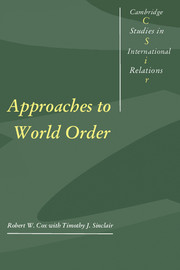Book contents
- Frontmatter
- Contents
- Preface
- Acknowledgements
- Part I Overviews
- Part II Theory
- Part III Interpretations
- 10 The global political economy and social choice (1991)
- 11 “Real socialism” in historical perspective (1991)
- 12 Structural issues of global governance: implications for Europe (1991)
- 13 Middlepowermanship, Japan, and future world order (1989)
- 14 Production and security (1993)
- 15 Global perestroika (1992)
- Part IV Multilateralism
- Complete bibliography of works by Robert W. Cox to 1995
- Index of names
- Index of subjects
- CAMBRIDGE STUDIES IN INTERNATIONAL RELATIONS
10 - The global political economy and social choice (1991)
Published online by Cambridge University Press: 05 June 2012
- Frontmatter
- Contents
- Preface
- Acknowledgements
- Part I Overviews
- Part II Theory
- Part III Interpretations
- 10 The global political economy and social choice (1991)
- 11 “Real socialism” in historical perspective (1991)
- 12 Structural issues of global governance: implications for Europe (1991)
- 13 Middlepowermanship, Japan, and future world order (1989)
- 14 Production and security (1993)
- 15 Global perestroika (1992)
- Part IV Multilateralism
- Complete bibliography of works by Robert W. Cox to 1995
- Index of names
- Index of subjects
- CAMBRIDGE STUDIES IN INTERNATIONAL RELATIONS
Summary
In the late twentieth century, a powerful globalizing economic trend thrusts toward the achievement of a market Utopia on the world scale. At the present moment, no counter-tendency effectively challenges the globalization thrust. The market appears to be bursting free from the bonds of national societies, subjecting a global society to its laws. Yet, as Karl Polanyi discerned of nineteenth-century Britain, the freeing of the market can in the longer run provoke an equally powerful reaction as society seeks to curb its disintegrating and alienating consequences. Already, elements of opposition to the socially disruptive consequences of globalization are visible. The question remains open as to what form these may take, as to when and how they may become more coherent and more powerful.
The answer hinges on changes in the power relationships among social groups on the world scale. In particular, it implies a weakening of the arrangements for management of international economic relations as put in place during the pax Americana of the postwar world. But, the taming and civilizing of the market presupposes a development of social and political forces that are global in their reach. Such social forces are emerging among women, environmentalists, peace activists, indigenous peoples, trade unions, and churches, to name but a few examples of popular sector movements that increasingly are opposed to the harmful consequences of globalization. These movements present a dramatically different range of social choices and have the potential, if they can merge their consciousness and concerns, for a new political discourse.
- Type
- Chapter
- Information
- Approaches to World Order , pp. 191 - 208Publisher: Cambridge University PressPrint publication year: 1996
- 5
- Cited by

